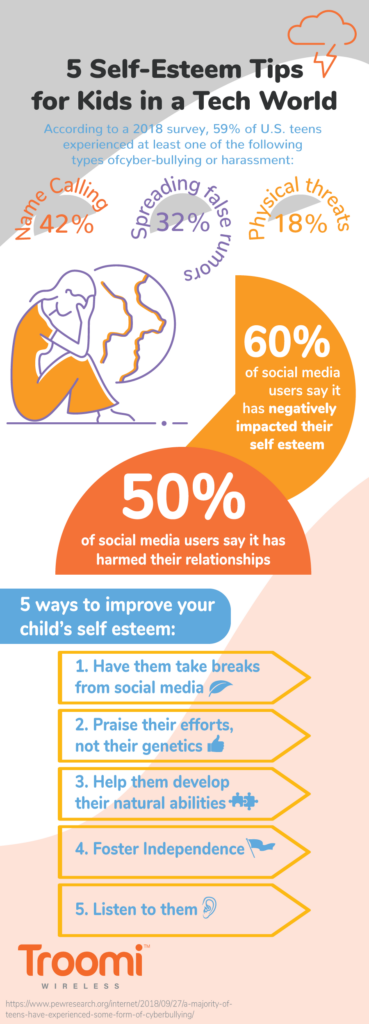
Teaching self esteem to teenagers is no walk in the park because adolescence is NOT easy. Between the acne and the insecurity, you couldn’t pay most of us to relive those years. And with modern technology it can be even harder for kids to go through their most important development years without feeling shame or loneliness.
The good news: we know a lot more about how technology impacts the brain, which means we have more ways to counter the negative effects of tech on teens to help them improve their self esteem.
Here are five ways you can make your home a tech-positive, self-loving environment.
1. Create a Growth Environment
Many individuals—especially teens—struggle with failure. When they make a mistake, they will often blame themselves and lose hope. It’s important to help them learn about having a growth mentality:
Allow and Encourage Mistakes
Make your home a place where mistakes and failure are just a stepping stone on their path to success rather than an abrupt end to their journey. Celebrate the fact that they tried—even participation trophies count for something!
Teach Them About Common Humanity
This is the idea that we are all experiencing similar struggles, we are all imperfect, and we all fail sometimes—so we should help each other out instead of being critical! As a parent, make sure you practice common humanity by being vulnerable with your child when needed and sharing your own struggles.
Encourage Positive Self-Talk
Negative self-talk can be a reflex for many of us, especially kids. After failing a test, for example, your child might think, “I’m so stupid.” This type of mentality can cause your kid’s self esteem to go down the drain. Instead, teach your child to stop and ask if what they are saying to themselves is what they would say to a friend. Have them try again: “I’m not stupid—I just need a little more practice.”
2. Teach Self-Kindness
It’s important to teach your child to be kind to themselves in every way:
Promote a Positive Body Image
Many teens struggle with their self esteem, so teaching self esteem tips to your kids can make all the difference. For example, teach them to be kind to themselves when it comes to their body. Encourage them to tell themselves they are beautiful or handsome when they look in the mirror every morning. Give them words of affirmation to help their confidence and avoid the perception of negative body image. You should be your child’s #1 cheerleader (take that as literally as you want—pom poms are never a bad idea)!
Practice Self-Care
Teach your child to take care of themselves. Encourage them to take a moment to say some kind words or do something nice for themselves. Remind them that it’s ok to set aside time just to relax and take a break from their challenges or as Parks and Recreation calls it, “treat yo’ self!”
Try Mindfulness
Mindfulness involves regularly asking yourself how you feel and why they feel that way. Dr. Karen Bluth teaches teens to calm emotions by bringing their “attention to their feet, and just notic[ing] what the bottoms of their feet feel like.” This self-awareness can help kids identify their feelings, reconnect with their bodies, and work through their emotions.
3. Identify Their True Self-Worth
Most kids and teens tend to base their self-worth on the opinions of their peers or the unrealistic standards of society. You remember how it was: from side pony to side part and chains to chokers, if you weren’t rocking the style of the day, you were a “nobody.” Many teens believe that they are worth less than their peers if they don’t dress and act a certain way or have certain friends. Obviously this isn’t true, but because of that type of thinking, it can often be hard for them to understand just how important and valued they are. This type of thinking can cause them to have a lack of self worth and negative body image. There are a few ways to help themselves see their own worth:
Set Goals
When children know what they want to achieve, they’ll be less concerned about things that aren’t important, like appearance or social status. Talk to them about what they want to do in school, who their heroes are, and what kind of careers or hobbies they might be interested in pursuing. Then make a few smart goals with them: specific, measurable, attainable, relevant, and time bound.
Make a List of Talents
It can be helpful for kids to identify what they’re good at. This could be a sport or musical instrument, or it could be as simple as making the bed or building with legos. Remind them of this list and add to it regularly.
End the Day with a Pep-Talk Session
Set some time after dinner to talk about successes from the day. It can be just ten minutes and everyone can share an accomplishment. Doing this will help them see what they actually value in their day-to-day lives and what they’re most proud of.
4. Manage Social Media Time
It’s no secret that social media isn’t great for mental health and self image. It’s a major contributor to a lack of self worth, depression, and other mental illnesses, so it’s important to manage how much time your kids spend on social media.
It can be hard to decide whether or not to ban social media in your home because of its negative consequences, however with Troomi, your child can gain lifelong skills to avoid and overcome the dangers of social media. Troomi phones allow your children to learn little by little how to regulate their media use as you give them more and more access to social media and other features. In other words, as your child masters tech use skills, they get to “level-up” and learn new skills just like they would in their favorite video game.
Troomi also has their own phones and data plans, so check them out and see if they’re right for your family.
5. Start a Hobby!
Sure this might sound obvious, but between taking tests, trying to make friends, and practicing for extracurriculars, kids have enough high-stakes activities on their hands. Introducing a low-stakes side project can give them something to look forward to and find success in. Try some of these hobbies with your kids:
- Gardening. A perfect low-stakes way to spend time together, get outside, and see little daily success—there’s nothing better than seeing a new sprout grow out of the soil.
- Non-competitive video games. Competitive online games might be making your child feel defeated. Try co-op games you can play together, or story-driven games that encourage problem solving and trial-and-error.
- Cooking. Learning to cook is a life-changing skill with seriously delicious rewards. Get those kids in the kitchen and start making meals together.
- Camping. No competitions, no expectations. Just pure time in the outdoors that can be healthy for the mind and body.

